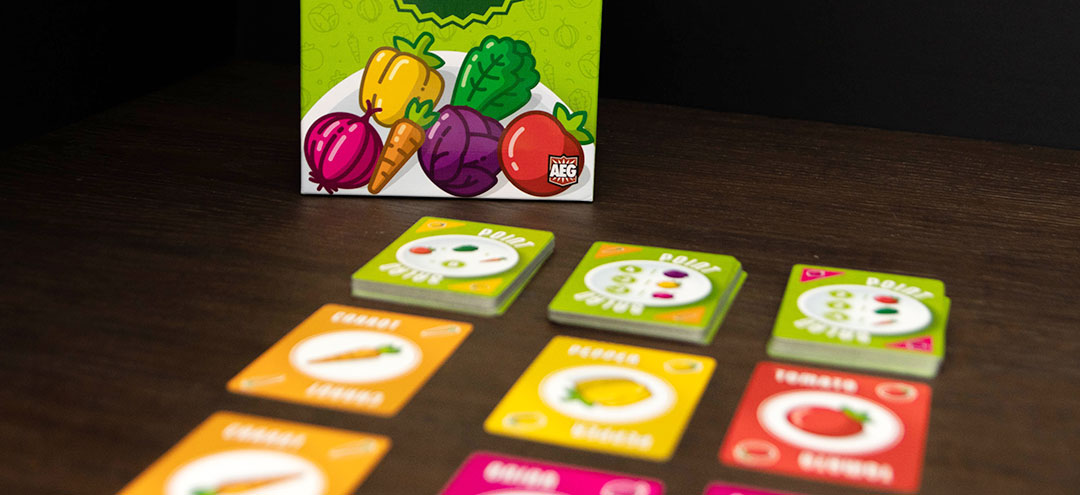 In board gaming circles, point salad refers to a game where almost every available action will score you some amount of points. Most often this is attributed to Stefan Feld games like Castles of Burgundy or Trajan. So Point Salad is a bit of a meta-joke where you get points as you draft vegetable cards into your salad.
In board gaming circles, point salad refers to a game where almost every available action will score you some amount of points. Most often this is attributed to Stefan Feld games like Castles of Burgundy or Trajan. So Point Salad is a bit of a meta-joke where you get points as you draft vegetable cards into your salad.
Hopefully the game is better than the pun…
Gameplay Overview:
Point Salad is dead simple to explain. Each card has a veggie on one side and a way to score points on the other. There are three columns of cards and the top row of each column is a point card. Every point card is different. It could be points for each lettuce, points for every tomato/lettuce/cabbage set, or points for the fewest onions. You may, on your turn, take one of the point cards.

Below the point cards, there will be six veggies—two in each column. Instead of taking a point card you can take any two available veggie cards. These don’t give you any new ways to score points but hopefully help fulfill the point cards you’ve previously taken. After these are selected, the available points cards will flip over to their veggie-side to fill in the columns.
The only other action you can take on your turn is to flip over a point card you’ve previously taken. Maybe you aren’t completing the sets you hoped to or you need the extra lettuce that is on the back. This is a free action and can be done in addition to taking a point card or two veggies, but only once per turn.
The game ends when every card has been picked. Players will score all their point cards based on the veggies they’ve collected. The player with the most points is the winner.

Game Experience:
Point Salad is a good introductory weight tableau-building game. The fact that it can accommodate a large range of player counts makes it easy to get to the table.
While the groan-inducing name evokes popular Feld’s, it doesn’t bear much resemblance mechanically to the euros from which it draws inspiration. That is expected—this is much lighter weight—but there is a very strong emphasis on specialization and luck. Ideally, every point card you get would give you points for the same veggie type or two and you can collect nothing but those until the end of the game.

The balance between point cards and veggie cards is what makes Point Salad a lot of fun to play. Each turn you’ll have some decisions to make. Occasionally they will be very easy—getting a few scoring cards that care about lettuce and cabbage and then drafting all the lettuce and cabbage you see if a perfectly reasonable strategy. Other times it’ll be a trade-off between pulling yourself in too many directions or taking some veggies you don’t need hoping to grab something later to make them worth something.

The end of the game can become a little math-y as you try to determine exactly how many points each of the available veggies will give you. You are also required to take two veggies as long as they are available, so if you’ve pushed hard for just a small number of different veggies you may end up being forced to draft a couple that won’t score or may score negatively. This gives some additional strength of a “wider” strategy.
I do have two minor gripes. First, the setup can be a pain. With three players you need 9 of each veggie, exactly half the deck. Counting out each of the six types isn’t hard, but it isn’t much fun either. The other is the game feels pretty similar every time. Although there are 108 different scoring cards, they are mostly variations of the same types of things. There isn’t anything that is going to surprise you on your subsequent plays, but for a 20-minute filler experience, it isn’t too big of a deal.
Final Thoughts:
Point Salad is the exact type of game that I think has a spot in most gamer’s collections. You can teach it in two minutes. It plays well at all its player counts. As you add more players, the game becomes a little more luck dependent and a little less strategic, but either way, you’ll have interesting choices to make.
Quick playing games that provide a good balance between luck and thoughtfulness can be difficult to find. Point Salad is a good one and it’ll fits in the small gaps of your game nights between bigger games or while you wait for everyone to arrive. While the experience in Point Salad isn’t different enough each play that you’ll run to grab it off the shelf every time you get a group together, it’s still a fun experience when it hits the table.
Final Score: 3.5 Stars – A good filler game with tableau building and drafting elements.
 Hits:
Hits:
• Quick to play and supports 2-6 players well.
• Interesting trade-offs between taking point or veggie cards.
• Easy to teach and plays in less than half an hour.
Misses:
• Setup can be minorly inconvenient.
• The experience can be similar each time.






















